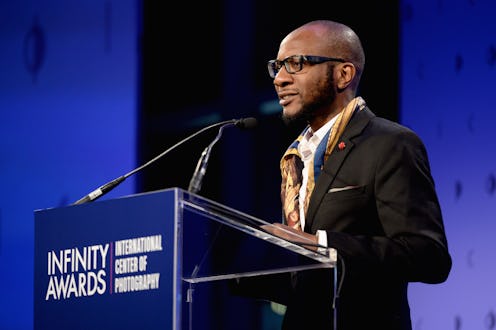Books
Teju Cole Explores Life in Lagos, Nigeria
Teju Cole writes the way his narrator rides the bus: observant and guarded, careful not to reveal too much. Something simple like taking public transportation can become fraught with danger in Lagos, Nigeria, where our unnamed narrator of Every Day is for the Thief (Random House) is visiting after years of absence. Ignoring the warnings from his family, he heads to the danfo anyway. “The energy of Lagos life — creative, malevolent, ambiguous — converge at the bus stops,” he says. “There is no better place to make an inquiry into what it was I longed for all those times I longed for home.” Striking that careful balance between alertness and guardedness, laced with “the will to be violent” if necessary, becomes a matter of survival, a way to get through daily life in the city.
Every Day Is for the Thief is Cole’s first book, originally published in 2007 in Nigeria. He followed up with Open City in 2012. Thief is labeled fiction, but it doesn’t read like a novella. This slim volume could pass as a collection of short place essays. The main character — the loud and gritty one, the one with the flaws, the one primed for change or destruction, is Nigeria itself.
Nigeria is complicated. Often, it’s downright unsafe. Every minor social and business interaction has the potential for drama. In a city teeming with thieves and tricksters, it’s hard to trust anyone. The safe thing to do would be to barricade yourself inside, behind a few locked gates if you can swing it. The safe thing to do would be to hide — but you can’t do that. You have to go to work, to school, to the shops. “If you sit in your house, if you refuse to go to market, how would you know the existence of others?” our narrator asks. “How would you know of your own existence?” After all, you’re only really living when you venture out into the world.
What appeals to the narrator about Nigeria is the very frenzied energy that repels him. Africa is a place full of “literary texture” and “lives full of unpredictable narrative.” For all its faults, Lagos is rich in passion and drama in a way that an idyllic New England town never could be. He finds himself feeling sorry for writers who have to “ply their trade from sleepy American suburbs, writing divorce scenes symbolized by the very slow washing of dishes.” Imagine if John Updike had been African, he muses. Think of what he might have done with some good material!
Updike and his ilk peek behind the curtains of those safe, boring, middle-class homes and expose the troubled, shameful secrets hidden beneath the idyllic façade. While Updike’s characters are washing dishes and getting divorces, Cole’s are running out to the market and witnessing horrible violence against a child who is caught stealing. His subject is so loud it almost speaks for itself. Cole writes about Nigeria with great restraint, but not without emotion. He embraces an entire spectrum, ranging from disappointment to excitement to anger to love. Cole is careful careful, though, not to get carried away with any of them.
Only distance makes the telling of his story possible. The smells, noises, and other annoyances of day-to-day living in Lagos don’t leave much room for creative pursuits. Some days the narrator gets little writing done but does manage to shoot a few photographs. Images from the author accompany every chapter, and like the prose, they’re taken from a distance: through a screen, a window, or the gaps in a wall. The perspective is understandable — even necessary — but I couldn’t help wishing I could get closer.
It’s well worth the hours spent going over the words and studying the photographs in Thief, but it was difficult getting past my own expectations for what fiction should do — introduce us to people who are as reckless and dynamic as the cities they inhabit.
